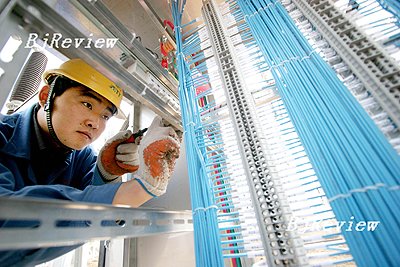
China's gross domestic product (GDP) growth in the first half of 2007 hit 11.5 percent, which is beyond the expectation of some international research institutions. Previous estimates from Standard Chartered Bank were 10.6 percent and from JP Morgan Chase & Co., 10.8 percent.
The National Bureau of Statistics (NBS) also didn't believe there would be such a high GDP growth. "This year we had planned for an economic growth of 8 percent, but the actual growth is faster than expected," said Li Xiaochao, spokesman of NBS at the press conference when statistics of the national economy in the first half were released.
The rapid growth of China's economy is making it a bellwether for the global economy.
High growth coupled with inflation
Different from previous situations, the Chinese economy witnessed high growth coupled with inflation in the first half of this year.
In previous years, when releasing economic figures, spokespersons for the NBS were able to announce with pride that the national economy was rapidly growing but had low inflation. This is no longer the case. Although high growth remains unchanged, low inflation doesn't exist anymore. The NBS figures show that in the first half, the consumer price index (CPI) increased 3.2 percent, the highest level in the past three years. In June, the CPI rose 4.4 percent. This was much higher than the expected 3-percent target set by the central bank at the beginning of this year and nearer to the country's 5-percent security line of inflation.
According to Li, one notable characteristic for the CPI growth in the first half was its structural increase. This was mainly lifted by the higher prices of food, including grain, meat, meat products and eggs. Of the 3.2 percent growth of CPI in the first half, food price contributed 2.5 percentage points.
This trend of high growth with inflation worries experts.
Zhu Jianfang, economic analyst with CITIC Securities, contends that while the GDP growth is a little bit fast, the CPI's rise from 2.7 percent in the first quarter to 3.5 percent in the second quarter and further hit 4.4 percent in June is a major sign. "In recent years, such price hike only appeared in 2004 when the economy was overheated," said Zhu.
Vincent Chan, head of China research for the investment bank division of Credit Suisse in Hong Kong, said that China's economic growth will not be lower than 11 percent this year while the highest CPI growth may be 5-6 percent. This is a challenge to the sound development of the Chinese economy.
Consumption contributes
Consumption has contributed more to economic development in the first six months.
By Li's account, from January to June, the total fixed asset investment stood around 25.9 percent, which was 3.9 percentage points lower than the rate in the same period last year. At the same time, total retail sales of consumer goods increased 15.4 percent, 2.1 percentage points higher than a year ago, representing the fastest increase since 1997. The gap between the growth of investment and consumption is narrowing. "Consumption is playing a stronger role in pulling up the economy," said Li.
Figures from the NBS indicate that retail sales of consumer goods amounted to 4.2 trillion yuan. Moreover, increases of retail sales in urban and rural areas are almost balanced. In the first six months, retail sales in urban and rural areas totaled 2.85 trillion yuan and 1.35 trillion yuan, up 15.9 percent and 14.3 percent, respectively, year on year.
According to Li, there are three reasons for the growth of consumption. First, the increase in income promotes the growth in consumption. In recent years, improved economic returns of enterprises boosted the income of employees. Together with the reform of civil servants' salaries, intensive subsidies to low-income groups, the raising of the minimum wage of migrant workers, and the adoption of a series of policies adjusting allocation structures and supporting farmers, incomes of both urban and rural residents have increased.
Second, residents' expectations about government expenditures remain good. Since the governments at various levels have intensified their inputs into the social security system and committed themselves to solving problems related to people's lives such as education, health care and housing, the Chinese people are optimistic about the future and more confident in spending.
Third, the quality of products is increasing. In the first half, retail sales of automobiles, household electrical appliances, construction and decoration materials as well as furniture shot up 36.7 percent, 20.7 percent, 41 percent and 43.4 percent, respectively, year-on-year. The growth rates were 9 percentage points, 8.4 percentage points, 16.6 percentage points and 22.6 percentage points higher than those in the same period last year. This indicates that people's expenditure in key fields, namely, automobiles and housing, is increasing rapidly. Furthermore, since the industrial chains of automobiles and housing are long, they are playing a fairly big role in driving economic development.
| 